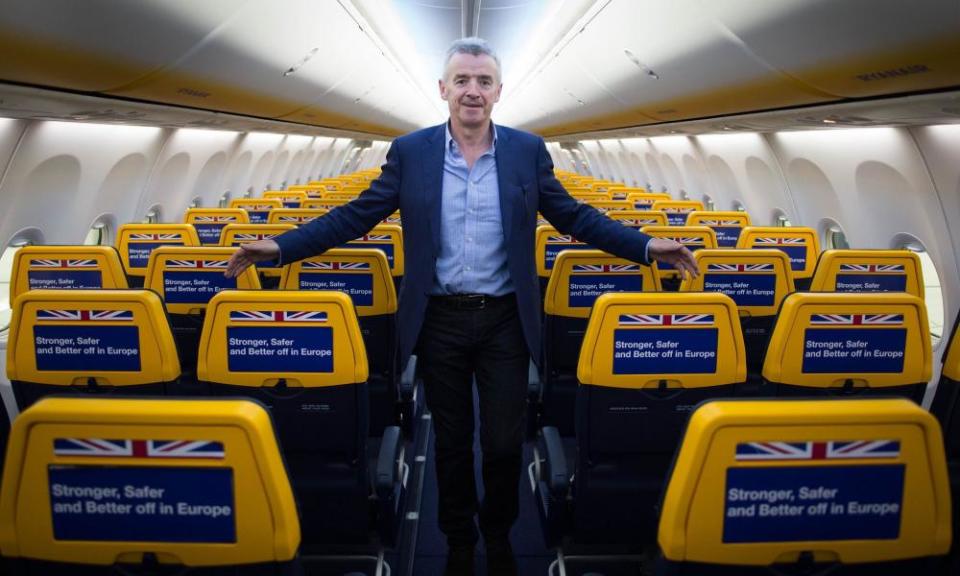Cool your jets, Michael O'Leary – Brexit unlikely to ground Ryanair | Nils Pratley

Every industry wants its interests to be uppermost in the trade negotiations between the UK and the EU, but few companies shout as loudly as Ryanair. In its latest dispatch, the Irish carrier warned there was “the distinct possibility of no flights between Europe and the UK for a period after March 2019 in the absence of a bilateral deal”.
Technically speaking, Ryanair is correct. Once the UK leaves Europe’s “open skies” agreement, something will have to take its place. Historical World Trade Organization rules, as the company says, don’t cover aviation. So, yes, it is just about conceivable that Stansted, Gatwick and other UK airports dominated by tourist traffic to the EU could grind to a halt temporarily.
But, rather than being “distinct”, the possibility is surely remote. Reaching agreement on rules to cover UK/EU flights ought to be relatively easy because the alternative is horrible for both sides. Every hotelier from Corfu to the Canaries would be screaming for a deal if there were a chance that British tourists wouldn’t arrive in 2019. Similarly, Lufthansa would probably prefer its Heathrow service to continue without interruption.
Ryanair’s Michael O’Leary should calm down. The overall trade negotiations may prove to be hellish, but it is still reasonable to assume that planes will fly between the UK and EU in April 2019. Other people, like the five million citizens unsure of their right to remain, have bigger worries.
Blocking of Deutsche Börse merger no great loss for LSE
Margrethe Vestager, the EU competition commissioner, is adamant: the decision to block the £21bn merger between the London Stock Exchange and Deutsche Börse had nothing to do with Brexit.
Nobody can prove otherwise, of course, since the commission has wondrous models to assess when a “de facto monopoly” is created. In the short version, it demanded that the two parties sell a modest Italian bond-trading platform to preserve competition in the clearing of such fixed-income instruments. The LSE and Deutsche refused. Thus the deal had to die.
But, as a postmortem, this account isn’t remotely comprehensive. The strong suspicion remains that Brexit pushed events in only one direction.
This deal, remember, was unveiled in those faraway days when the UK referendum was seen as a piece of political theatre with a dull ending. After the vote for Brexit, nervousness in the German financial establishment was obvious. The two companies planned to combine under a UK holding company, and while the chief executive would be Deutsche’s Carsten Kengeter, he was deemed in some quarters of Frankfurt to be dangerously Anglophile. The City had the opposite fear that trading and clearing activity would be sucked to the continent over time.
Was the Italian role crucial or incidental? In their original sop to the commission, the LSE and Deutsche agreed to sell a UK and French clearing house to their Paris-based rival Euronext. Then the commission demanded at the 11th hour that MTS, the Italian platform for trading government bonds, be thrown into the deal. Milan, it seems, hated the idea of being a bargaining chip in an Anglo-German deal that would simultaneously advance French interests. But nobody seems to have tried terribly hard to change minds.
Add it all up, and the political will to champion this deal – and to make Vestager’s job harder – was absent. Put another way, it was folly to launch a “merger of equals” ahead of the UK referendum. This was the third attempt in 17 years to combine LSE and Deutsche. It was inviting trouble to attempt the trick during the post-referendum political argy-bargy. The mood music between the two companies never felt right after the poll.
From a UK perspective, the collapse feels like no great loss. Whatever the LSE says about the opportunity to create “a world leading market infrastructure group anchored in Europe”, the risks to the City were undeniable. The view here has been consistent: if we don’t know what passporting and clearing arrangements will apply in future, how can anybody sensibly say if a merger would protect or threaten London’s interests?
In short term, the LSE chief executive, Xavier Rolet, who would have left if the merger had been cleared, needs to decide if he’s coming or going. But this is not a company in crisis. To raise spirits, it is throwing £200m at a share buyback and the stock, up from 800p in 2013 to £31, stands near its all-time high. The LSE should do fine in independent form.
And let’s hope Vestager has also scared off would-be US bidders like Intercontinental Exchange, owner of the New York Stock Exchange. Amid the many Brexit uncertainties, the last thing London needs is a US bid for the owner of its most important financial infrastructure.

 Yahoo Finance
Yahoo Finance 